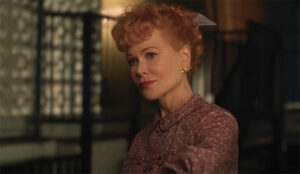Being the Ricardos
Posted on December 9, 2021 at 5:36 pm
B +| Lowest Recommended Age: | High School |
| MPAA Rating: | Rated R for language |
| Profanity: | Very strong language |
| Alcohol/ Drugs: | Drinking, smoking |
| Violence/ Scariness: | Tense emotional confrontations |
| Diversity Issues: | A theme of the movie |
| Date Released to Theaters: | December 10, 2021 |

We get to see what an intense, challenging, and serious business producing 22 minutes of comedy is. Lucy, who explains to a director she thinks is third-rate that she is not like Danny Thomas, whose “Make Room for Daddy” show he had been working on. “He tells jokes,” she says with palpable irritation, “I am a physical comedian.” All around her are people who seem to be getting in the way of her vision for the show, whether it is grumpy William Frawley (J.K. Simmons), who plays Fred, Vivian Vance (Nina Arianda), who feels neglected, or the television network and sponsors, who seem to think they can tell her what to do. But nothing oppresses her more than her own perfectionism. She just knows that there is some key to a dinner scene that will take it from cute to hilarious, and she just has to keep thinking about it until she can lock it in. “She’s working through beats all the time,” a character says. It is clear she will sacrifice almost anything including damaging her professional and personal relationships if that is what it takes to get every minute of the show exactly where it needs to be. We see in flashbacks her struggles as a starlet, with studios who did not know what to do with her so her roles were limited to “sticking my head in a frame, saying something biting, and going home.”
That is more than enough to occupy her full attention, but she is also facing three terrible threats, one to her show, one to her career, and one to her marriage.
It is the height of the “Red Scare,” and even the child actor on “Make Room for Danny” has had to sign a loyalty oath. Walter Winchell, the most powerful journalist in the country, has accused Lucille Ball of being a communist. In this era, even an whispered, unsubstantiated accusation of communism could mean being blacklisted, so that no jobs in movies, television, or radio would ever be offered again. “I Love Lucy” might be the most popular show on television, but it could be canceled overnight.
Another possible reason for canceling the show — Lucille Ball was pregnant. It is hard too understand for today’s audiences, but in those days not only did even real-life married couple Lucille Ball and Desi Arnaz have separate twin beds on the show (as did every other married couple on television). For the purposes of television, sex did not exist, and the idea that a pregnancy might make audiences consider how it came about was unthinkable for the television network and the cigarette company sponsor. They tell Lucy that she can just stand behind things and go on as usual, pretending that the pregnancy did not exist. But she rightly believed that the audiences would be thrilled to experience the real-life and television pregnancy. (They did decide that the show would never include the actual word “pregnant,” however, using the euphemistic but not fooling anyone term “expecting.” by the way, they were also not allowed to use the word “lucky,” because it was the name of a rival brand of cigarettes.)
And then there is the most painful of all. A gossip magazine has published photos of what they say is Desi fooling around with other women. That puts at risk not only Lucy’s career but her marriage to the father of the child she already has and the one she is expecting.
I would love a world where Aaron Sorkin wrote everyone’s dialogue. Every sentence is perfectly composed. But the British have an expression “too clever by half” which I think of when he is both writer and director with no intermediary. The script is dazzling. The brilliance of the lines tips over into a quippiness that distracts us from the real conflicts and emotions that are going on. And there’s always an uncanny valley risk when even the best actors play real-life people whose faces and gestures and voices we know almost as well as we know our own family. The issues presented are engaging in their own terms and as reflections of our time but because of the impenetrable glossiness of the script it never does what Lucille Ball was so good at — making us love her.
Note: It is interesting that three of the biggest end-of-year films were made by adults about their parents: “Belfast,” “King Richard,” and this film, produced by Lucie Arnaz and Desi Arnaz, Jr.
Parents should know that this movie includes very strong language, frank sexual references, including adultery, and a sexual situation.
Family discussion: Which problem was the most difficult? Which relationship was the most functional?
If you like this, try: “I Love Lucy” and the TCM podcast about Lucille Ball, “The Plot Thickens,” season three. This is the episode about the accusations of communism. Watch “The Big Street,” the tragic drama where she plays a showgirl loved by a busboy played by Henry Fonda. My favorite of her movie performances is in the Tracy-Hepburn film “Without Love,” where she plays a whip-smart Washington liaison.
